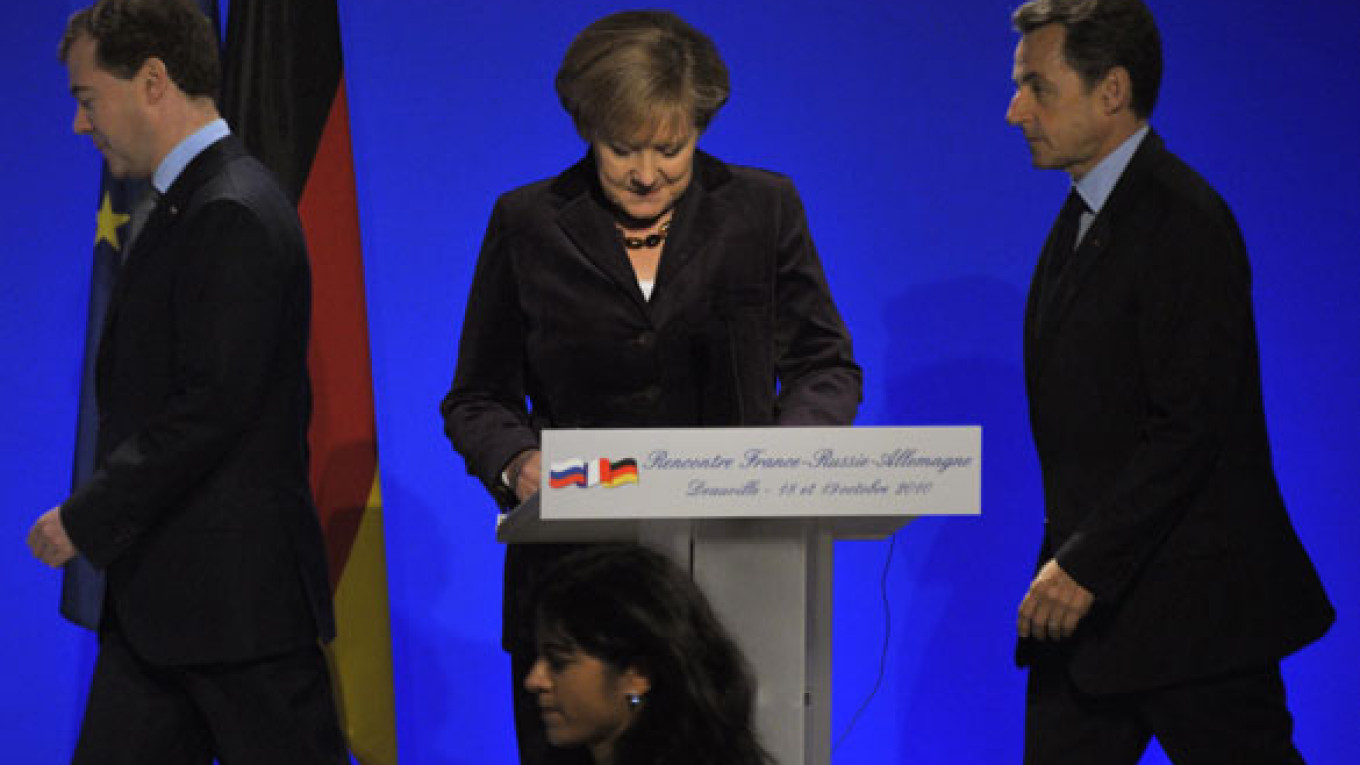Europe and Russia can build a visa-free zone with common economic and security spaces before 2025, French President Nicolas Sarkozy said Tuesday.
"From my point of view, in 10 to 15 years the vision that we should have is a common economic EU-Russia space, end of visa requirements and a common security concept," Sarkozy told reporters after talks with President Dmitry Medvedev and German Chancellor Angela Merkel in France.
The two-day tripartite summit in the northern French sea resort of Deauville was seen as an attempt by two of Europe's key players to move forward both the EU's and NATO's often difficult relations with Moscow.
Medvedev has touted a new European security architecture since becoming president in 2008 and pushed for visa-free travel with the EU over the past months. But the Kremlin's hopes have been frustrated by reservations among EU and NATO member states.
The EU says visa-free travel with Russia can come only after it has been established with members of the Eastern Partnership, a group of six states including Ukraine and Georgia.
NATO has suggested that Medvedev's vision of a common security space from Vancouver to Vladivostok is best discussed by the Organization for Security and Cooperation in Europe.
In a joint statement Tuesday, the three leaders merely said they would continue to strengthen security in both the trans-Atlantic and Eurasian territories and called for more security cooperation with Moscow from both the EU and NATO.
Medvedev said he had accepted an invitation to attend the NATO summit in Lisbon next month, but he left open whether Moscow would agree to cooperate with the alliance on missile defense in Europe.
"We are still discussing this proposal, but I think that NATO also must understand how it sees the inclusion of Russia," he said, national news agencies reported.
Medvedev also promised to keep pushing for a road map to visa-free travel. "Everybody knows we have to cancel the visa regime, and we understand it cannot be done straight away," he said. "It must be a process, and it needs to have a road map."
Merkel said progress would be incremental. "We should move forward step by step," she said in televised comments.
Moscow has also championed closer cooperation with Brussels by forming a joint European Union-Russia security committee to resolve regional crises.
The committee was proposed by Merkel during a Russian-German summit in June, when she asked Medvedev to resolve a "frozen conflict" between Moldova and its separatist region of Transdnestr as a test case of cooperation with Europe.
Medvedev said Tuesday that he discussed Transdnestr with Merkel and Sarkozy but that progress could only be achieved after political stability is achieved in Moldova, which has scheduled early parliamentary elections for Nov. 28.
French-German-Russian summits have not been held since President Jacque Chirac, Chancellor Gerhard Schröder and President Vladimir Putin were in office, and when the EU was deeply divided over its stance toward Moscow.
But an EU official on Tuesday welcomed the format, saying any discussions that improved and clarified the situation would benefit the EU as a whole.
"EU-Russia relations depend on member states' good relations with Russia," Denis Daniilidis, spokesman of the EU delegation to Russia, told The Moscow Times.
A Message from The Moscow Times:
Dear readers,
We are facing unprecedented challenges. Russia's Prosecutor General's Office has designated The Moscow Times as an "undesirable" organization, criminalizing our work and putting our staff at risk of prosecution. This follows our earlier unjust labeling as a "foreign agent."
These actions are direct attempts to silence independent journalism in Russia. The authorities claim our work "discredits the decisions of the Russian leadership." We see things differently: we strive to provide accurate, unbiased reporting on Russia.
We, the journalists of The Moscow Times, refuse to be silenced. But to continue our work, we need your help.
Your support, no matter how small, makes a world of difference. If you can, please support us monthly starting from just $2. It's quick to set up, and every contribution makes a significant impact.
By supporting The Moscow Times, you're defending open, independent journalism in the face of repression. Thank you for standing with us.
Remind me later.


